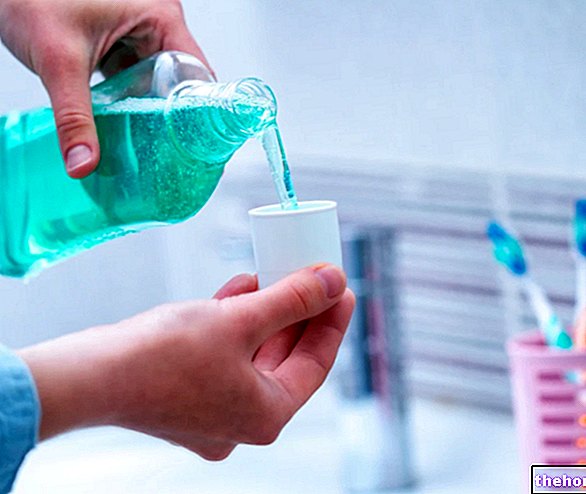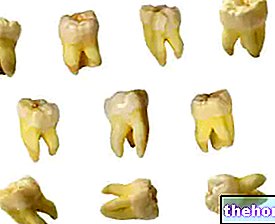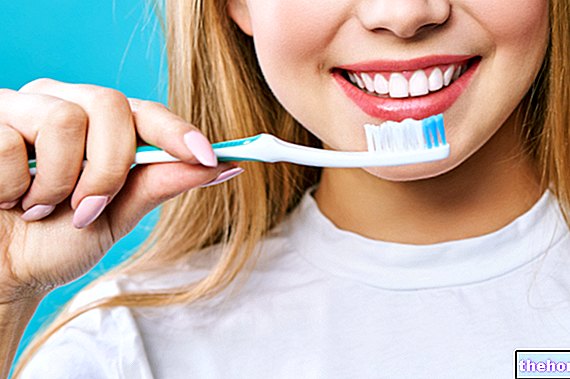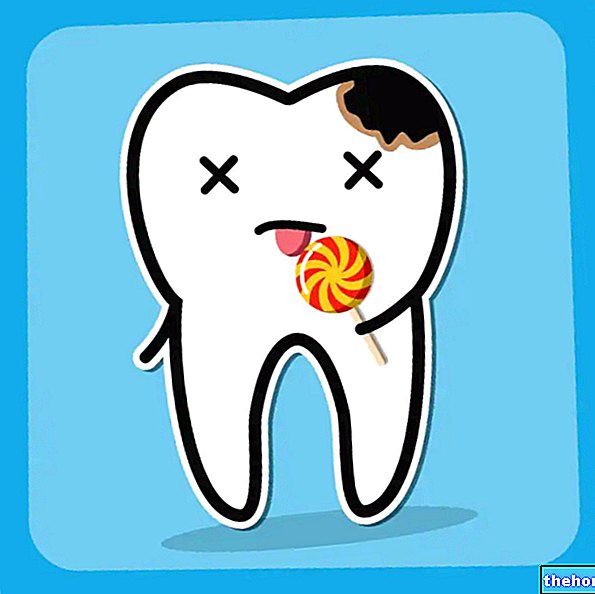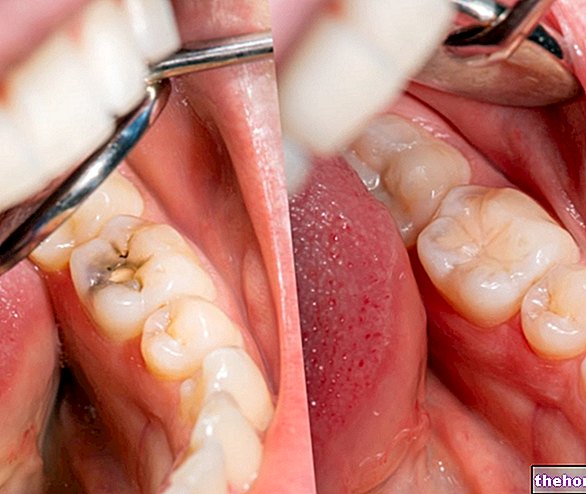Halitosis (or bad breath) is an unpleasant and embarrassing condition characterized by the emission of foul-smelling air from the mouth. The problem can be linked to multiple factors.

Sometimes, halitosis becomes a lit indicator of even serious morbid processes, especially affecting the digestive system (stomach acidity, digestive disorders, gastroesophageal reflux, peptic ulcer), respiratory (pneumonia, sinusitis, rhinitis, tonsillitis) and renal (insufficiency renal).
The material published is intended to allow quick access to advice, suggestions and general remedies that doctors and textbooks usually dispense for the treatment of Halitosis; these indications must in no way replace the opinion of the treating physician or other healthcare specialists in the field who are treating the patient.
What to do
- Drink plenty of water and keep your mouth moist. The water and saliva help to clean the oral cavity and teeth, facilitating the removal and removal of bacteria
- Brush your teeth immediately after waking up. In the morning, halitosis is a particularly common phenomenon due to the physiological reduction of salivary flow. For this reason, it is recommended to use toothpaste and a toothbrush upon awakening.
- Pay particular attention to oral hygiene:
- Brush your teeth at least three times a day and after each snack
- After carefully brushing your teeth with toothpaste and toothbrush, rinse your mouth with mild and refreshing mouthwashes
- Floss at least once a day
- Let's briefly remember that one of the most common forms of bad breath depends on incorrect oral hygiene
- Use fluoride-enriched toothpastes to prevent cavities, which can cause bad breath
- Chewing slowly and for a long time promotes the digestion of food
- Taking sugar-free candies and balsamic gums is an excellent remedy for masking halitosis. The "therapeutic" anti-bad breath effect of balsamic gums and candies is enhanced by their ability to stimulate salivary secretions
- To effectively ward off halitosis, it is necessary to root out the disease that caused it. Before taking any remedy for halitosis, a doctor's consultation is strongly recommended
What NOT to do
- To smoke. Even smoke is an enemy of fresh breath. The toxins contained in it, in fact, give the breath a particularly unpleasant odor; moreover, smoking promotes dry mouth, aggravating halitosis
- Excessive use of mouthwashes and antiseptic substances (disinfectants). Both poor dental hygiene and excessive use of these products negatively affect the freshness of the breath. This statement is explained by the presence of essential oils in mouthwashes: these substances, exercising their astringent function, end up reducing salivation and favoring halitosis
- Fast. Fasting is NOT a good remedy for halitosis
- Use mouthwashes formulated with clove (eugenol) extracts. Its essential oil, in fact, boasts a highly astringent power, responsible for reducing salivation. For this reason, the use of similar mouthwashes is not considered a valid remedy for halitosis
- Drinking alcohol: Alcohol can also promote halitosis
- Chew a little and quickly
- Binge eating: even binging is the enemy of "halitosis. The body, in fact, finding an exaggerated mass of food in the stomach, tends to slow down all digestive mechanisms and, as we know, digestive difficulty favors halitosis.
What to eat
- The diet has a huge influence on the freshness of the breath; therefore, following a healthy and balanced diet helps to prevent bad breath:
- Drinking plenty of water (approx. 2 liters / day) helps keep the oral cavity clean and prevents dry mouth (possible cause of halitosis)
- Kefir, yogurt and sour milk: some authors are convinced that these dairy products hinder the formation of halitosis. In fact, the acidity of the aforementioned products can aid digestion, ensuring fresher breath
- Celery and raw vegetables at will help keep the mouth fresh and clean
What NOT to Eat
- Avoid the consumption of foods that are difficult to digest, such as dips, fries and foods rich in fat and too tasty
- Overly spiced foods.
- Garlic and onion. If you just can't help it, combine these foods with a generous amount of parsley
- Milk and derivatives (limit consumption): some authors are of the opinion that the administration of milk and dairy products can favor halitosis as milk proteins are particularly appreciated by bacteria (which, by metabolizing them, favor halitosis)
- Foods that decrease salivation: salty foods, foods rich in simple sugars
- Preserved fish and red meats (limit their intake)
- Foods rich in tannins such as tea, wine and cocoa (limit consumption), which promote dry mouth
Natural Cures and Remedies
Phytotherapy plays a prestigious role in the prevention and treatment of halitosis (especially the type physiological):
- Avocado (Persea Gratissima): natural remedy indicated to treat halitosis dependent on gastro-intestinal disorders. Although it has diuretic properties, avocado is indicated as a remedy against halitosis for its digestive capacity and for its richness in fibers
- Prepare a glass of hot water with 1 teaspoon of apple cider vinegar (the acidity of the vinegar promotes digestion) + 1 teaspoon of honey (substance corrigens, i.e. able to improve and correct the taste).
- Mouthwashes formulated with disinfectant and antibacterial substances (essential oils):
- Lemon (Citrus limon)
- Tangerine (Citrus nobilis)
- Bitter orange (Citrus aurantium)
- Mouthwashes formulated with balsamic and refreshing substances:
- Mint (Mentha piperita)
- Eucalyptus (Eucalyptus globulus)
- Digestive and stimulating salivary and biliary secretions herbal teas:
- Fennel (Foeniculum vulgare)
- Anise (Pimpinella anisum)
- Caraway decoction (Carum carvi): digestive properties, useful natural remedy against halitosis dependent on gastric disorders
- Aromatic plants such as sage (Salvia officinalis), Rosemary (Rosmarinus officinalis) and parsley (Petroselinum sativum)
Pharmacological treatment
- The ideal cure for halitosis depends on the cause that induced it. Considering the multifactorial origin of the disorder, we report the classes of medicinal substances most used to treat the most common forms of halitosis:
- Mouthwashes and toothpastes: useful remedy to treat halitosis due to poor oral hygiene:
- cetylpyridinium
- chlorhexidine
- chlorine dioxide
- zinc and bicarbonate
- For the treatment of gastritis-dependent halitosis, the most used pharmacological remedies are:
- Antacid drugs (eg aluminum and magnesium hydroxide)
- Proton pump inhibitors (eg Pantoprazole, Omeprazole, Lansoprazole)
- Protectors of the gastric mucosa (eg sucralfate)
- For the treatment of "halitosis dependent on peptic ulcer, it is recommended to take:
- Histamine H2 receptor antagonists (eg Nizatidine, Cimetidine)
- Mouthwashes and toothpastes: useful remedy to treat halitosis due to poor oral hygiene:
Prevention
- Cleaning the teeth with toothpaste and toothbrush after each meal, at least three times a day, is a useful remedy to avoid the nesting of bacteria in the oral cavity. Furthermore, cleaning the teeth is an important precaution to prevent not only halitosis, but also pathologies of the oral cavity such as gingivitis, pyorrhea, caries, etc.
- Undergo professional dental hygiene once every 6-12 months to remove plaque and tartar, possible accused of bad breath
- Drink plenty of water to avoid dry mouth
- Stop smoking
- Floss at least once a day to improve teeth cleaning
- Avoiding certain foods such as garlic and onion is an excellent remedy for preventing halitosis
Medical treatments
- The so-called "physiological" halitosis - that is, dependent on the "intake of some foods that are enemies of" fresh breath - can soon be masked by "careful hygiene of the oral cavity; the "heavy breath" effect vanishes as soon as the body completely eliminates that food. In such circumstances, it is not necessary to proceed with any specific medical treatment.
- Halitosis dependent on a pathology of the oral cavity requires first of all the treatment of the underlying disease. For example, caries may require an accurate filling, while the pulpits a devitalization or an extraction. The healing of the dental disease causes, as a consequence, , the "removal of" bad breath.
- Halitosis dependent on gastric, kidney or respiratory problems can be eradicated only after the root cause has been cured. Consult your doctor.

